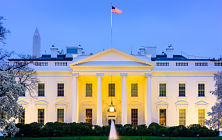
The US Environmental Protection Agency (EPA) is to impose tough new limits on carbon pollution from the US power sector, telling large, existing coal and natural gas-fired plants they must slash their emissions by 90% or face being shut down.
The agency says its proposed new carbon pollution standards for coal and gas plants are intended to protect public health, reduce harmful pollutants and deliver up to $85bn in climate and public health benefits over the next two decades.
The proposal would avoid up to 617 million metric tonnes of total carbon dioxide (CO2) being emitted up to 2042, equivalent to the emissions of roughly half the cars in the US. It would also result in tens of thousands of tonnes of particulate matter (PM2.5), sulphur dioxide, and nitrogen oxide being cut, preventing in 2030 alone approximately 1,300 premature deaths; more than 800 hospital and emergency room visits; more than 300,000 cases of asthma attacks; 38,000 school absence days; and 66,000 lost workdays.
The new rule will be consistent with the existing approach to establishing pollution standards for power plants under section 111 of the Clean Air Act, says the EPA, and will call on technologies such as carbon capture and sequestration/storage (CCS), low-ghg hydrogen co-firing, and natural gas co-firing, which can be applied directly to power plants that use fossil fuels to generate electricity.
Rural clean energy investment
Separately, the White House has announced a programme for investment in clean energy across rural America, which will unlock $11bn of Inflation Reduction Act funding.
The funding will take the form of grants and loan opportunities, available through two specific programmes: $9.7bn through the Empowering Rural America (New ERA) programme for eligible rural electric cooperatives to deploy renewable energy, zero-emission, and carbon capture systems; and $1bn through the Powering Affordable Clean Energy (PACE) programme in partially-forgivable loans to renewable energy developers and electric service providers to help finance large-scale solar, wind, geothermal, biomass, and hydropower projects, and energy storage in support of renewable energy systems.
Expanding clean energy to rural communities is critical to meeting the administration's goal of net-zero emissions by 2050, officials said.
Speeding up energy infrastructure permitting
The Biden administration has asked Congress to approve legislation that will speed up the federal permitting process for building energy infrastructure, outlining a set of provisions it wants to see implemented.
John Podesta, White House senior adviser for clean energy innovation and implementation, said, "Right now, the permitting process for clean energy infrastructure, including transmission, is plagued by delays and bottlenecks."
The administration says that reforms are needed to "build out modern American energy infrastructure and supply chains with the speed and safety that the moment demands".
These reforms would aim to accelerate the deployment of critical electric transmission infrastructure; accelerate energy project permitting on federal lands; modernise America’s 150-year-old mining laws and responsibly develop domestic critical minerals; deploy hydrogen and carbon dioxide infrastructure; improve permitting efficiency and predictability; enhance data collection needed for effective permitting; cut duplicative and burdensome analysis and reviews; improve community engagement; and establish clearer requirements for mitigating environmental harms, among other things.
Environmental NGO the Sierra Club welcomed the proposals but warned that if they promoted fossil fuel infrastructure or undermined environmental justice considerations, they would be unacceptable.
